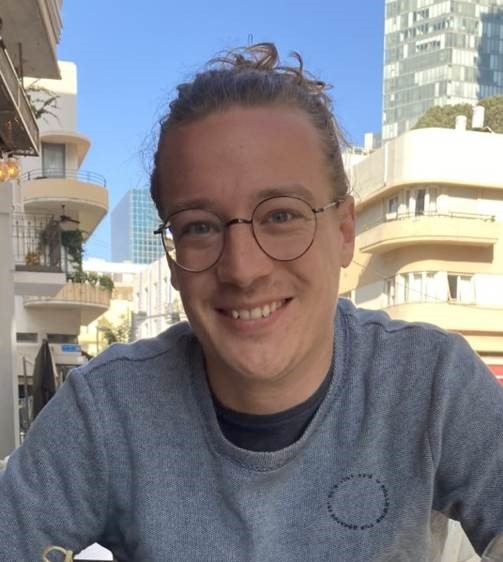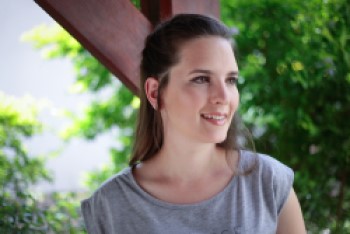Post-doc in Neuroscience
The Tanenbaum post-doc program is the main scholarship program for post-doc fellowships in neuroscience at TAU The program is generously supported by the Larry and Judy Tanenbaum Family Foundation
For information about application please contact: yuliaagr@tauex.tau.ac.il
 Flavio Schmidig I am interested in the intersection of sleep and memory. I am currently exploring the possibility of using eye movements to study episodic memory. Traditionally, episodic memory has been studied using explicit retrieval tasks, such as asking participants to recognize learned items. However, these tasks have a number of limitations, including the fact that they can exclude certain population groups (e.g., infants, aphasic individuals) and that they cannot distinguish between memory per se and the ability to report these memories. This seems particularly important for memory performances that rely on sleep consolidation. My research aims to go beyond these limitations by using a no-report paradigm that relies on eye movement. I believe that this approach has the potential to provide a more accurate and comprehensive understanding of episodic memory, as it will allow us to study this type of memory in a wider range of population groups. I am excited to continue my research in this area and to contribute to our understanding of how sleep and memory interact
Flavio Schmidig I am interested in the intersection of sleep and memory. I am currently exploring the possibility of using eye movements to study episodic memory. Traditionally, episodic memory has been studied using explicit retrieval tasks, such as asking participants to recognize learned items. However, these tasks have a number of limitations, including the fact that they can exclude certain population groups (e.g., infants, aphasic individuals) and that they cannot distinguish between memory per se and the ability to report these memories. This seems particularly important for memory performances that rely on sleep consolidation. My research aims to go beyond these limitations by using a no-report paradigm that relies on eye movement. I believe that this approach has the potential to provide a more accurate and comprehensive understanding of episodic memory, as it will allow us to study this type of memory in a wider range of population groups. I am excited to continue my research in this area and to contribute to our understanding of how sleep and memory interact
 Hila Doron Caenorhabditis elegans is one of biologists’ most important model organisms. Accordingly, research using the worm led to numerous discoveries (and 6 Nobel prizes awarded since the year 2000). In particular, the worm proved to be the leading animal for studying epigenetic inheritance, namely inheritance of information which is carried across generations independently of changes to the DNA sequence. This microscopic worm is often described as a “free-living” nematode, and thus it is routinely grown in the lab on a petri dish under controlled conditions. Extensive work from our lab showed how environmental stimuli shape the epigenetic landscape and small RNA inheritance and how neuronal-derived small-RNAs control behavior transgenerationally. But, what if the worm exploits epigenetics differently in a natural habitat? And, how can we validate that transgenerational inheritance is indeed physiologically relevant for the fitness of worms in nature? Recently, wild-isolate strains were utilized to study phoretic behavior with isopods as dispersal hosts. Yet, very little is known about the neuronal basis of phoretic behavior. In addition, whether such natural behavior in complex environments could be regulated by small-RNAs remains obscure. In this project, I am studying how worms behave and interact with snails as a genetic model for natural complex environments. We aim to identify robust transgenerational behavioral phenotypes and study their neuronal basis and their molecular mechanisms. Utilizing our model to challenge worms back into complex environments, we hope to uncover the importance of transgenerational inheritance and unmask novel traits in the worms.
Hila Doron Caenorhabditis elegans is one of biologists’ most important model organisms. Accordingly, research using the worm led to numerous discoveries (and 6 Nobel prizes awarded since the year 2000). In particular, the worm proved to be the leading animal for studying epigenetic inheritance, namely inheritance of information which is carried across generations independently of changes to the DNA sequence. This microscopic worm is often described as a “free-living” nematode, and thus it is routinely grown in the lab on a petri dish under controlled conditions. Extensive work from our lab showed how environmental stimuli shape the epigenetic landscape and small RNA inheritance and how neuronal-derived small-RNAs control behavior transgenerationally. But, what if the worm exploits epigenetics differently in a natural habitat? And, how can we validate that transgenerational inheritance is indeed physiologically relevant for the fitness of worms in nature? Recently, wild-isolate strains were utilized to study phoretic behavior with isopods as dispersal hosts. Yet, very little is known about the neuronal basis of phoretic behavior. In addition, whether such natural behavior in complex environments could be regulated by small-RNAs remains obscure. In this project, I am studying how worms behave and interact with snails as a genetic model for natural complex environments. We aim to identify robust transgenerational behavioral phenotypes and study their neuronal basis and their molecular mechanisms. Utilizing our model to challenge worms back into complex environments, we hope to uncover the importance of transgenerational inheritance and unmask novel traits in the worms.

